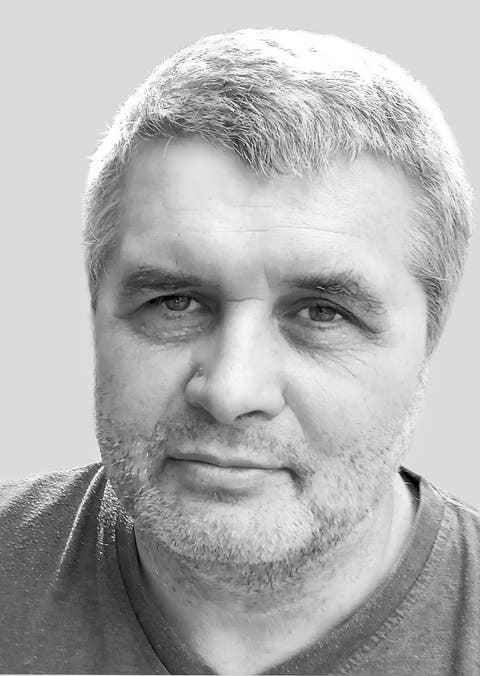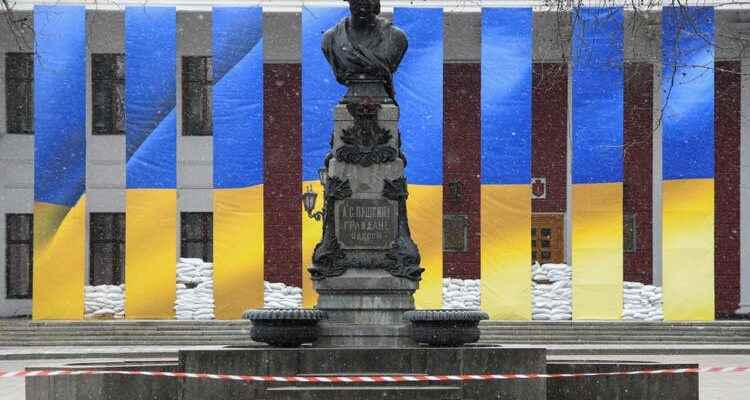Sergei Gerasimov is holding out in Kharkiv. In his war diary, the Ukrainian writer reports on the horrific and absurd everyday life in a city that is still being shelled.
Pushkin monument in Odessa.
November 9, 2022
This day started a few minutes after midnight when I went to the window to watch the predicted lunar eclipse. I didn’t notice any. The full moon floated through the silvery mist, and the still, bare trees, lit by the mist’s pearly glow, were magical.
You never get to see such landscapes in a normal city, because a normal city has many luminous windows and street lamps. A completely darkened city may be beautiful, but the lack of light leads to a large number of accidents on the roads. Every day people die because they are invisible; they get hit by cars.
It’s early morning and I’m in a grocery store. The saleswoman diligently speaks Ukrainian with the customers, learned sentences, but then turns away and, addressing a colleague, curses in Russian.
A newspaper article I read recently taught us to swear in Ukrainian and listed many authentic Ukrainian swear words that patriots now all had to memorize. But the saleswomen aren’t patriotic enough or just don’t have time to read and study, so they happily keep swearing in their native language.
The situation between the Ukrainian and Russian languages is tense, but not as clear-cut as Mr. Danilov would like (the secretary of the Ukrainian National Security Council believes that Russian should disappear from Ukrainian territory altogether).
When Ukrainian soldiers enter a city in the Kharkiv region, they ask locals in Russian:
“Are there any Russians here?”
“No, all the Russians ran away yesterday,” the locals respond happily, also in Russian.
The soldiers also thank them in Russian.
Being Russian and speaking Russian are two different things.
I wonder why Mr. Danilov doesn’t just ban all military personnel from using the Russian language. He probably decided that it would be more practical to wait until our Russian-speaking heroes won this war and drove out the Russians, and only then forbid them to use their native language.
He’s right, of course: that would be much more practical.
Today the Pushkin monument in Kharkiv, which was initially protected against vandals with sandbags, was surprisingly removed. I don’t think it’s a good idea to wipe Alexander Pushkin out of the picture. In fact, “racism” is not simply directed against Ukraine or the Ukrainian national idea. Racism is a force of evil opposed to human freedom as such, to civilization as a whole, to progress and to culture. Pushkin has done far more for human liberty, civilization, progress and culture than any man alive today, including – with all due respect – the most ardent Ukrainian patriots.
In this sense, Pushkin campaigned against racism for almost two hundred years before the word was invented. Racism did not exist yet, but its main characteristics are already gnawing through the minds of people living in Russia: totalitarianism, national chauvinism, suppression of any kind of dissent, and the cult of aggressive war.
Then there is mediocrity, an all-consuming mediocrity. Hitler wanted to be an artist, Stalin a poet. Putin is a nobody, the epitome of mediocrity, a colorless moth.
Pushkin accomplished so much and fought so resolutely against proto-racism that it doesn’t really matter whether his statue is on Kharkiv’s Theater Square or not. History cannot be changed and the monument is just a heavy lump of bronze.
What makes me a little sad about all the fuss about the monument is that the nationalists who took it down didn’t ask if Kharkiv residents wanted it or not. But to tell the truth, there was no other way. Nationalists, even the most educated and intelligent among them, are characterized by the fact that they never ask anyone’s opinion. Nationalists around the world suffer from a kind of tunnel vision that makes them think, “If I want it, then I’m right.”
Today the Russians announced that they will leave Cherson. The Russian defense minister has ordered the withdrawal of troops from the area on the right bank of the Dnipro. The “orcs” start mining all of Kherson and prepare to turn it into a desert of concrete rubble and broken glass.
We are preparing to pound artillery fire on Russian troops as they attempt to retreat across the Dnipro.
To person

Sergei Gerasimov – What is the war?
Of the war diaries written after the February 24 Russian invasion of Ukraine, those of Sergei Vladimirovich Gerasimov are among the most disturbing and touching. They combine the power of observation and knowledge of human nature, empathy and imagination, a sense of the absurd and inquiring intelligence. Gerasimov was born in Kharkiv in 1964. He studied psychology and later wrote a psychology textbook for schools and scientific articles on cognitive activity. His literary ambitions have so far been science fiction and poetry. Gerasimov and his wife live in the center of Kharkiv in an apartment on the third floor of a high-rise building. The NZZ published 71 “Notes from the War” in the spring and 69 in the summer. The first part is now available as a book on DTV under the title «Feuerpanorama». Of course, the author does not run out of material. – Here is the 51st contribution of the third part.
Translated from the English by Andreas Breitenstein.
